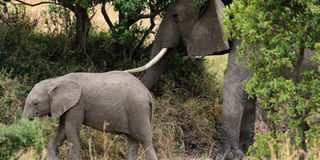Breaking News: At least 10 feared to have drowned in Makueni river
With app, it is easier for rangers to fight poaching

Elephants grazing at Mara North Conservancy on September 16, 2016. An app dedicated to preservation of the rich flora and fauna has been launched. PHOTO | JEFF ANGOTE | NATION MEDIA GROUP
What you need to know:
- Mr Leshan was referring to the panic button on the app that, once clicked, sends a distress signal to the headquarters and help is sent immediately.
- Rangers have the choice to use Kiswahili for those not conversant with English and an illiterate one can use icons.
Rangers in Kenya’s major conservancies have a new weapon in their armoury: a smartphone.
The phones are installed with Wild — an Android-powered app that is solely dedicated to preservation of the rich flora and fauna that Kenya is renowned for globally.
The app is barely a week old since its launch at the Mara North Conservancy, part of the expansive Maasai Mara Game Reserve.
For a ranger, the conservancy is demarcated into patrol areas and once he or she logs in, all one needs to do is click to start a patrol.
The ranger has options to report incidents such as the sighting of a poacher, the sound of gunfire, human-wildlife conflict, sighting a rare species, discovering a snare and finding suspicious footprints.
They can also take photographs.
This data is relayed real-time to monitors at a central position and, because the phones use GPS technology, a ranger’s position in the park can be determined immediately.
Mr John Leshan, a ranger in Mara North, said: “These phones have made our work very easy. You do not have to carry pens and notebooks to record what you see.
The work of protecting animals is challenging and so we have no fear when fighting with poachers. Also, you do not have to rush back to the office.”
Mr Leshan was referring to the panic button on the app that, once clicked, sends a distress signal to the headquarters and help is sent immediately.
Wild (Wildlife Information Landscape Database), a USaid-funded project, was developed by iLAB at Strathmore University, but the concept is fully owned by the users — conservancies and, by extension, rangers.
Rangers have the choice to use Kiswahili for those not conversant with English and an illiterate one can use icons.
The data collected by rangers across the conservancies is accessible to authorised personnel in the 13 agencies that have embraced the technology.
The data can be used to study trends and mitigate dangers such as human-wildlife conflict.
It will also be crucial for researchers and scholars studying behavioural habits of animals in these ecosystems.
Recent studies show that in the areas around Amboseli, farmers lost crop worth $2 million (Sh200 million) to wildlife in 874 recorded incidents of human-wildlife conflict.
There are plans to integrate the Kenya Wildlife Service into the system.
Conservationist Scott McCormick said: “The good news is, the app gives an opportunity to have a consolidated system for all conservancies and concerned government agencies, thus improving efficiency.”




